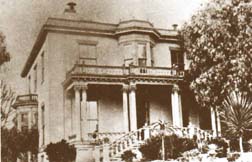|
Colonel James Walker Benet
served as the Commandant of Benicia's Civil War ear Arsenal
from mid-1905 to mid-1911. During this time he, his wife
Frances and their youngest son, Stephen, lived in the
Commanding Officer's Quarters. When not away - such as
at college - daughter Laura and son William also called
the Mansion home.
During the family's Benicia
years, Stephen grew from child to teen. Also, this was
an important time in which the family was together, before
the children began achieving literary success.
In addition to his Arenal
duties, the Colonel was an avid reader and active father,
heavily influencing his children in the areas of literature,
history and the military code of duty, honor and country.
Stephen would later write two historical poems, for example.
One of these, John Brown's Body, relied in part
upon his father's civil war stories (Colonel Benet had
met Grant, Sherman and other generals when a child). These
stories were strengthened by the settings in which they
were told, including the Civil war era atmosphere of the
Benicia Arsenal.
Also, Stephen built upon
his father's teaching of "duty, honor, country"
during the second World War. At that time, Stephen served
America by writing articles, national broadcasts and presidential
speeches - that were important in helping Americans, first
prepare for war and, then, to fight it.
Yet the Benet children
were not the Colonel's only "students." In Benicia's
old Athens-like environment, several other young writers
were frequent visitors. These included Leonard Bacon,
a young professor at UC Berkeley, and a struggling news
reporter named Sinclair Lewis. Lewis, in fact, spent the
entire summer, as well as Christmas, of 1909 - with the
Benets in Benicia.
Poet Bacon later described
the Arsenal as "the back-drop of a romantic play,
all pepper trees and acacias and fountains and pillared
porches." About the Colonel he said: "he knew
more about English poetry than most poets and all professors."
Novelist Lewis felt much love for the Colonel - in contrast
to the distance he felt from his own narrow-minded father.
Lewis loved the Colonel for his wit, his learning, his
kindness and his high standard of honor - "but most
of all for an almost indefinable gracefulness and graciousness
and ease which has always instructed me."
In future years, the young
people whom the Colonel influenced would publish close
to 100 books. These works would earn four Pulitzer Prizes
for poetry (two for Stephen, one for William and one for
Bacon), one Pulitzer for literature and America's First
Nobel Prize for literature (both earned by Lewis).
Influencing so many future
successful writers - an impressive achievement for a career
army officer. That those future writers grew and developed
in Benicia - left an impressive legacy for a small, California
town.
|

The
Commanding Offcer's Quarters
|